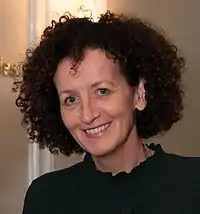Maja Haderlap
Maja Haderlap (born 8 March 1961 in Eisenkappel-Vellach (Slovene: Železna Kapla-Bela, Carinthia) is a bilingual Slovenian-German Austrian writer, best known for her multiple-award-winning novel, Angel of Oblivion, about the Slovene ethnic minority's transgenerational trauma of being treated as 'homeland traitors' by the German-speaking Austrian neighbors, because they were the only ever-existing military resistance against National Socialism in Austria.[1]
Maja Haderlap | |
|---|---|
 Maja Haderlap (2016) | |
| Born | 8 March 1961 Eisenkappel-Vellach (Slovene: Železna Kapla-Bela), Carinthia |
| Occupation | Novelist, Poet |
| Nationality | Austrian |
| Alma mater | University of Vienna, Austria |
| Period | 1983 to present |
| Genre | Novel, Poetry |
| Notable works | Angel of Oblivion |
Life
Her grandmother who was sent to Ravensbrück concentration camp. At ten years old, Haderlap's father was tortured by the Nazis to disclose where his father, who joined Slovene Partisans, was hiding.[1] Her father often wanted to kill himself because of the way Austrian majority treated him. The family waited until he passed out, then pried his fingers from the gun. After reading her grandmother’s diary, she was “afraid of being overrun by the past, of being crushed by its weight.” She made a conscious decision to write about her family’s history in a novel.[2]
Work
She holds a PhD in Theatre Studies from University of Vienna and has worked at the Alpen-Adria-Universität in Klagenfurt. She was editor for many years of the Carinthian Slovene minority literary magazine 'Mladje' and wrote poetry, prose, and essays in both Slovenian and German. Her work has been published in numerous German and international literary journals and anthologies. From 1992 to 2007, she worked as drama supervisor at the Klagenfurt City Theatre. She is the most awarded member of the Graz's Guild of writers and lives in Klagenfurt.
Angel of Oblivion
Winning one of the most important awards for literature in the German language, the Ingeborg Bachmann Prize in 2011, and the Max Frisch Prize of the City of Zurich in 2018, her most notable novel was made into a drama and put on theater stages. The story is told from a point of view of a young girl, growing up in the late-1960s or early-1970s in the Austrian province of Carinthia, learning to navigate the terrain between Slovenian, a language of the past anti-Nazi resistance and present humiliation, and German, an escape from being treated as traitor by her German-speaking Austrian neighbors.[3]
Books
- Žalik pesmi, Poems (1983)
- Bajalice, Poems (1987)
- Poems - Pesmi - Poems (1989)
- Deček in sonce (The boy and the sun), zadruga Novi Matajur, Cividale and Klagenfurt, Carinthia, Založba Drava 2000 ISBN 3-85435-330-8
- Between Politics and Culture
- The city of Klagenfurt Theatre from 1992 to 2007. The era Pflegerl Dietmar (2007)
- Engel des Vergessens (Angel of Oblivion), Wallstein, Göttingen, 2011 ISBN 978-3-8353-0953-1
Awards
- 2018: Max Frisch Prize of the City of Zurich
- 2017: PEN Translation Prize for Angel of Oblivion, translated by Tess Lewis in 2016
- 2012: Honorary Doctor, University of Klagenfurt
- 2012: Writer in residence in one world foundation in Sri Lanka[4]
- 2011: Ingeborg Bachmann Prize for the novel "Angel of Oblivion"
- 2006/2007: Austrian State Scholarship for Literature
- 2005: Women's Culture Prize for Literature in the province of Carinthia
- 2004: Hubert Burda Prize as part of the Hermann-Lenz Prize
- 1989: Award of Prešeren Foundation
- 1983: Promotion Award of Carinthia
References
- Angel pozabe je postal moja pripoved (in Slovene; Angel of Forgetting has become my narrative), Delo's Pogledi Magazin, 2011, Ljubljana
- Keeper of Stories: On Maja Haderlap’s ‘Angel of Oblivion’, The Millions Literary Magazine, November 10, 2016
- Dve leti sem govorila o Koroški Slovencih, zdaj se moram vrniti k sebi, Delo, March 7th 2014
- Cf. owf.at: writer in residence Archived 2015-07-22 at the Wayback Machine
External links
- Private Homepage von Maja Haderlap
- Kurzporträt und Text Im Kessel bei bachmannpreis.eu
- ”Translation” (Poem) translated by Tess Lewis published in Words Without Borders, February 2016.